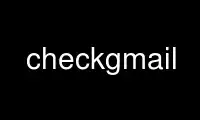
This is the command checkgmail that can be run in the OnWorks free hosting provider using one of our multiple free online workstations such as Ubuntu Online, Fedora Online, Windows online emulator or MAC OS online emulator
PROGRAM:
NAME
CheckGmail - system tray applet to check a Gmail account for new mail
SYNOPSIS
checkgmail [-profile] [-hosted] [-popup_delay] [-no_cookies] [-private] [-v | -verbose]
[-nocrypt] [-h]
DESCRIPTION
CheckGmail is an alternative Gmail Notifier for Linux and other *nix systems. It is fast,
secure and uses minimal bandwidth via the use of Atom feeds.
CheckGmail is a system tray application that checks a Gmail account for new mail. When new
mail is present the tray icon changes, an optional animated popup is displayed and a
tooltip displays the number and details of new messages. Configuration is GUI-based and
the application is designed to be simple, elegant and unobtrusive.
CheckGmail aims to be relatively secure in terms of password storage. Combined with
Crypt::Simple(3pm) the program provides the option of either encrypting the saved password
information or - for maximum security - re-entering your password each time the
application is run. If you decide to save the password, it is encrypted using a passphrase
generated from machine-unique information (the eth0 MAC address and/or uname system
information). Encrypting the password prevents both casual reading of plain text passwords
on your machine, but more importantly allows the CheckGmail config file in your home
directory to be stored securely on external backups.
For the password encryption function, CheckGmail depends on the Perl module
Crypt::Simple(3pm) CheckGmail will save passwords as plain text if this module (or
associated modules) is not present on the system.
OPTIONS
-profile=[profile_name]
Using this switch causes CheckGmail to read preferences from a file named
prefs-[profile_name] in ~/.checkgmail - thus allowing multiple instances of
CheckGmail to be run to check different Gmail accounts.
-hosted=[Gmail hosted domain]
Allows checkgmail to work for Gmail hosted domains. E.g. if your hosted domain is
test.net, run the program with -hosted=test.net Once run, the -hosted flag is not
required again for that profile.
N.B: You will need to delete the Atom feed address from your preferences or use a
new profile before using this option for the first time. Following a change in the
Gmail login code for hosted domains, this option does not appear to be compatible
with the -no_cookies method of checking mail.
-popup_delay=[time in millisecs]
Sets the time taken between the mouse entering the system tray icon and the tooltip
being displayed. Default is 250 millisecs as of version 1.10 (previous versions
used no delay).
-no_cookies
Uses the old Atom feed retrieval method (default in versions 1.7.2 and earlier) of
sending the username and password across https. The alternative, and currently
default method, is to login to Gmail, save the authentication cookies, and then
retrieve the Atom feeds without requiring any further authentication - this method
has the benefit of allowing various actions to be carried out upon new messages
received, such as deleting, marking as read, archiving or reporting spam.
-private
Prevents the display of message details in the popup - only the number of new
messages will be displayed.
-v | -verbose
Causes CheckGmail to print details of mail checking and mail contents to STDOUT
-nocrypt
Disables the use of Crypt::Simple to encrypt saved password information - passwords
will be saved as plain text.
-h Prints a usage message.
ENVIRONMENT
HTTPS_PROXY
Setting the HTTPS_PROXY environment variable will cause CheckGmail to use the
specified proxy server when checking for new mail.
Use checkgmail online using onworks.net services
